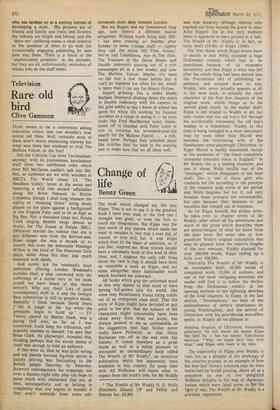Change of life
Benny Green
The book which changed my life was Kipps. That is not to say it is the greatest book I have ever read, or the first one I thought was great, or even the first to touch my imagination. But Kipps was the first novel of any stature which made me want to emulate it. Not that I. ever did, of course, or ever will, but it was Kipps which first lit the blaze of ambition, or, if you like, inspired me. Most literate people have a talismanic book of this kind in their lives, and I suppose the only odd thing about my case is that it should have been as venerable a work as Kipps, and not some altogether more fashionable work which knocked me sideways.
All books which grip the unformed mind in this way appear to that mind to have sprung full-grown into the world, like some rosy Renaissance Venus rising nubile out of an overgrown clam shell. That the story of Kipps might have deviated at any point in the plot, that the balance of the characters might conceivably have been tilted away from what we know, has always seemed to me as unthinkable• as the suggestion that Sam Weller never really knew Pickwick, or that Daisy Buchanan ran off in the end with Jay Gatsby. It comes therefore as a great shock as well as ti subtle pleasure to encounter an extraordinary book called The Wealth of Mr Waddy*, an American publication which has apparently been available in this country for some time now. All Wellsians will know what to expect from the book's title, for Mr Waddy was that shadowy offstage relation who reached out from beyond the grave to alter Artie Kipps's life at the very moment when it appeared to have ground to a halt. The Wealth of Mr. Waddy is, in fact, an early draft (18-99) of Kipps (1905).
The first shock which Kipps-lovers have to absorb is that Wells intended a huge Dickensian comedy which had to be abandoned because of its economic unviability, and that Kipps is what was left after the whole thing had been shoved into the Procrustean bed of publishing expediency and snipped down to size.
Waddy, who never actually appears at all in the later book, is actually the chief character of the first few chapters of the original work, which brings us to the second great shock. In the earlier draft, Kipps is not related to Waddy at all, but only comes into the old boy's life through his accidentally witnessing the old boy's mishap in a wheelchair. Waddy at this time is being besieged in a most mercenary way by none other than Muriel who becomes the ever-loving wife of the. flamboyant actor-playwright Chitterlow. In Kipps Muriel is hardly mentioned, except as the possessor of "the finest completely untrained contralto voice in England." In Mr Waddy she is a leading character, and one in whom Wells instills one of the ' messages' which disappears in the later draft. She is one of those girls who conducts her life according to the precepts of the romantic pulp novel of the period, and Wells despises her for it, not only because those precepts are contemptible, but also because they threaten to put novelists like himself out of business.
As for Kipps himself, the artless Artie, he takes over in chapter seven of Mr Waddy, after which all his adventures and much of the prose which describes them are mirror-images of what we know from the later book. But some idea of how grandiose Wells's original conception was may be gleaned from the relative lengths of the two versions, Waddy planned for over 200,000 words, Kipps ending up a little over 100,000.
Naturally The Wealth of Mr Waddy is an incomplete draft, 35,000 words of completed work, 15,000 of outlines, and one of the most intriguing exercises the reader will find is to follow the decline from the Dickensian solidity of the opening sections to the lightning sketches of the final chapters. In Kipps, in the last section, 'Terminations,' we hear of the embezzlement of Artie's inheritance by young Walshingham, and the arrival of Chitterlow with his providential box-office spoils. In Waddy all we glimpse is:
Amazing irruption of Chitterlow; Astounding generosity; He will return the money Kipps lent him! No — has has money. Tumultuous emotions: "Why, we might have that little shop," said Kipps with tears in his eyes.
The superiority of Kipps over Waddy is vast, but as a glimpse at the workings of the creative process, as an example of how the best-laid literary schemes, may be even better-laid by brutal pruning, ahove all as a peepshow on one or two'delightful Wellsian delights in the way of c aract isation which were fated never to e the light of day, The Wealth of Mr Waddy is a priceless experience.


































 Previous page
Previous page